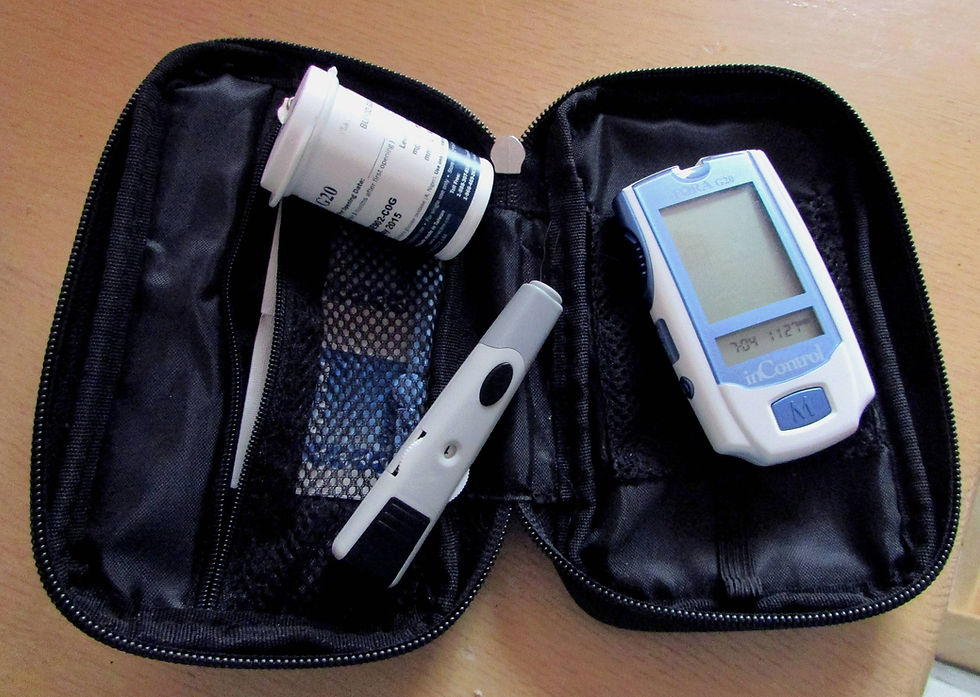Living With Type 3c Diabetes: What It Is, How It Happens, and What You Need to Know
- Bonita Payton
- Apr 5, 2025
- 4 min read

Most people have never heard of Type 3c Diabetes—yet it's more common than you think. It’s often misdiagnosed, misunderstood, and under-researched. As someone who has lived with Type 3c for over 25 years, I can tell you it’s not just about managing blood sugar—it’s about fighting for recognition, proper care, and the right diagnosis.
📝 What Is Type 3c Diabetes?
Type 3c Diabetes, also known as pancreatogenic diabetes, results from damage to the pancreas. This damage might be caused by:
Chronic pancreatitis
Pancreatic surgery
Trauma to the pancreas
Pancreatic cancer
Unlike Type 1 or Type 2, where autoimmune or insulin resistance is the primary cause, Type 3c is a secondary condition that happens when the pancreas can no longer produce enough insulin or other essential enzymes.
⚠️ How It’s Diagnosed (Or Missed)
One of the biggest challenges with Type 3c Diabetes is misdiagnosis. Many doctors will incorrectly code it as Type 2 or Type 1 for insurance purposes, especially because people with Type 3c often rely on insulin just like a Type 1 patient.
Accurate diagnosis involves:
Reviewing medical history for pancreatic issues
Measuring pancreatic enzyme levels (lipase, amylase, fecal elastase-1)
Imaging studies (CT, MRI, or abdominal ultrasound) to examine pancreatic damage
Recognizing loss of both endocrine and exocrine functions
Most primary care doctors and even endocrinologists may not fully understand how to identify Type 3c unless they specialize in pancreatic disorders.
🧾 What Insurance Companies Know—And What They Don’t
Unfortunately, insurance companies don’t officially recognize Type 3c Diabetes in most coding systems. Because of this:
Doctors often must code it as Type 1 Diabetes so that insulin, CGMs (like Dexcom G7), and necessary supplies are covered
Pancreatic enzyme replacements (PERT) are often denied or not covered without a fight
There is no standardized protocol for covering the full range of care for Type 3c
What insurance needs to learn:
Type 3c is a medically distinct condition with dual needs: insulin replacement and enzyme therapy
CGMs are not optional—they are essential for safe glucose management
Denials for these treatments create health risks, emergency visits, and long-term complications
🩺 What Type of Doctor Treats Type 3c?
You may need a multidisciplinary team for proper care:
Endocrinologist: For blood sugar and insulin management
Gastroenterologist: For pancreatic function and digestive enzyme support
Pancreatologist (if available): A specialist in pancreatic diseases
Nutritionist or Registered Dietitian: For meal planning and nutrient support
🧪 What Lab Tests Should You Ask For?
To ensure proper diagnosis and treatment, request these tests:
Fecal Elastase-1 Test (to check exocrine pancreatic function)
Comprehensive Metabolic Panel (CMP)
Hemoglobin A1c (average blood sugar over 3 months)
Serum Amylase & Lipase
Vitamin & Nutrient Panel (especially A, D, E, K, and B12)
CT or MRI imaging of the pancreas
🧵 What Daily Life Looks Like With Type 3c
Living with Type 3c means constant blood sugar monitoring. Personally, I wear a Dexcom G7 because my glucose levels can spike or crash at any moment.
Here’s what a typical day may include:
Checking blood sugar multiple times an hour
Taking insulin with precision
Taking digestive enzyme replacements with meals
Managing fatigue, nausea, or fogginess
Eating with timing and balance
It’s not something you can check three times a day and forget. It takes moment-to-moment awareness and adjustments.
👨⚕️ What Do Doctors Know?
Unfortunately, not enough. Even today, many providers:
Don’t differentiate Type 3c from Type 2
Don’t prescribe enzyme replacements
Don’t provide continuous glucose monitors unless forced
Don’t code the condition correctly, impacting insurance and treatment access
Patients often have to advocate for themselves, research, and bring awareness to their own care team.
📊 How Is It Treated?
Because the pancreas loses both endocrine (insulin) and exocrine (enzymes) functions, treatment is two-fold:
Insulin Therapy: Many people with Type 3c rely on insulin, often with strict timing and dosage.
Pancreatic Enzyme Replacement Therapy (PERT): These are capsules taken with meals to help the body absorb nutrients.
Glucose Monitoring: CGMs like the Dexcom G7 are crucial.
Dietary Guidance: Eating small, consistent meals with balanced macros.
🚨 Symptoms You Shouldn’t Ignore
People around you—or you yourself—should pay attention to:
Unexplained weight loss
Chronic digestive issues (bloating, gas, oily stools)
Sudden blood sugar crashes or spikes
Fatigue, even with stable glucose readings
A history of pancreatitis or abdominal trauma
These could be signs that something more than Type 2 is happening.
🛑 What Happens If It’s Left Untreated?
When Type 3c Diabetes is not properly diagnosed or treated:
Blood sugar levels remain unstable, leading to hyperglycemia or hypoglycemia crises
Lack of digestive enzymes can cause malnutrition and vitamin deficiencies
The immune system weakens due to poor nutrient absorption
Patients face higher risk of hospitalizations and long-term organ damage
Quality of life deteriorates due to fatigue, pain, and constant symptoms
Studies show that without insulin and enzyme therapy, survival rates are significantly reduced—especially in patients with underlying pancreatic disease. Early detection, proper treatment, and consistent monitoring can significantly improve both lifespan and quality of life.
✨ Final Thoughts
Type 3c Diabetes deserves more awareness, more research, and more compassion. It is not “just another type” of diabetes—it is a daily challenge that requires strength, knowledge, and a supportive care team.
If you or someone you love has dealt with unexplained blood sugar issues and a history of pancreatic problems, bring up Type 3c Diabetes at your next appointment. It might change everything.
#Type3cDiabetes #PancreatogenicDiabetes #ChronicIllnessAwareness #DiabetesAdvocate #DexcomG7 #MisdiagnosedDiabetes #DigestiveHealth #DiabetesEducation


Comments